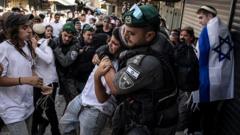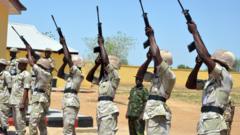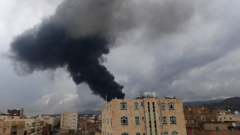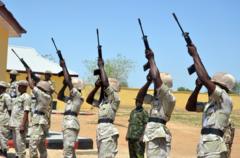In a provocative display on Jerusalem Day, far-right activists converged in the Old City and engaged in violent confrontations with local Palestinian residents. The annual event celebrates Israel's capture of East Jerusalem during the 1967 war but has increasingly been condemned for fostering an atmosphere of hatred and racism. Opposition leaders voiced strong disapproval, highlighting the potential implications for regional stability as the conflict intensifies.
**Far-Right March in Jerusalem Sparks Violence Against Palestinians Amid Nationalist Celebrations**

**Far-Right March in Jerusalem Sparks Violence Against Palestinians Amid Nationalist Celebrations**
Amid a period of rising tensions, far-right Israeli demonstrators clashed with Palestinians in Jerusalem during a controversial commemoration event.
The chaotic scenes began shortly after midday at the iconic Damascus Gate, where thousands of ultranationalists gathered, chanting inflammatory slogans such as "death to Arabs." Witnesses reported harassment of Arab shopkeepers, escalating hostilities attributed to the aggressive rhetoric from participants. Israeli police intervened, detaining several individuals as conflict erupted in the area.
National security minister Itamar Ben Gvir, who has been a divisive figure in Israeli politics, expressed support for the event, calling for severe consequences for individuals labeled as "terrorists." His visit to the Al-Aqsa mosque compound, a site of deep significance for both Muslims and Jews, drew condemnation from Palestinian officials who characterized it as a provocative act endangering regional peace.
Israeli Prime Minister Benjamin Netanyahu reiterated his commitment to maintaining Jerusalem as "united, whole, and under Israeli sovereignty," while opposition figures like Yair Lapid condemned the violence and labeled it as disconnected from Jewish values. Yair Golan, another opposition leader, echoed these sentiments, emphasizing the need for Jerusalem to be a shared city for all its inhabitants, regardless of faith.
Despite the cultural significance of the Jerusalem Day festivities for many Israelis, the coinciding military operations in Gaza, which have resulted in substantial loss of life, have placed the event under intense scrutiny. The backdrop of ongoing conflict further complicates the already fraught atmosphere surrounding the celebrations, framing them within a larger context of violence and resistance.
The international community remains divided on the status of East Jerusalem, with many recognizing it as territory under Israeli occupation. As tensions persist, the clashes during this year's celebrations serve to highlight the deep-rooted complexities of identity, nationalism, and historical grievances in the region.
As violence marks these nationalist gatherings, both Palestinians and Israelis grapple with the implications of ongoing strife and the future coexistence in a city sacred to both peoples.
National security minister Itamar Ben Gvir, who has been a divisive figure in Israeli politics, expressed support for the event, calling for severe consequences for individuals labeled as "terrorists." His visit to the Al-Aqsa mosque compound, a site of deep significance for both Muslims and Jews, drew condemnation from Palestinian officials who characterized it as a provocative act endangering regional peace.
Israeli Prime Minister Benjamin Netanyahu reiterated his commitment to maintaining Jerusalem as "united, whole, and under Israeli sovereignty," while opposition figures like Yair Lapid condemned the violence and labeled it as disconnected from Jewish values. Yair Golan, another opposition leader, echoed these sentiments, emphasizing the need for Jerusalem to be a shared city for all its inhabitants, regardless of faith.
Despite the cultural significance of the Jerusalem Day festivities for many Israelis, the coinciding military operations in Gaza, which have resulted in substantial loss of life, have placed the event under intense scrutiny. The backdrop of ongoing conflict further complicates the already fraught atmosphere surrounding the celebrations, framing them within a larger context of violence and resistance.
The international community remains divided on the status of East Jerusalem, with many recognizing it as territory under Israeli occupation. As tensions persist, the clashes during this year's celebrations serve to highlight the deep-rooted complexities of identity, nationalism, and historical grievances in the region.
As violence marks these nationalist gatherings, both Palestinians and Israelis grapple with the implications of ongoing strife and the future coexistence in a city sacred to both peoples.






















